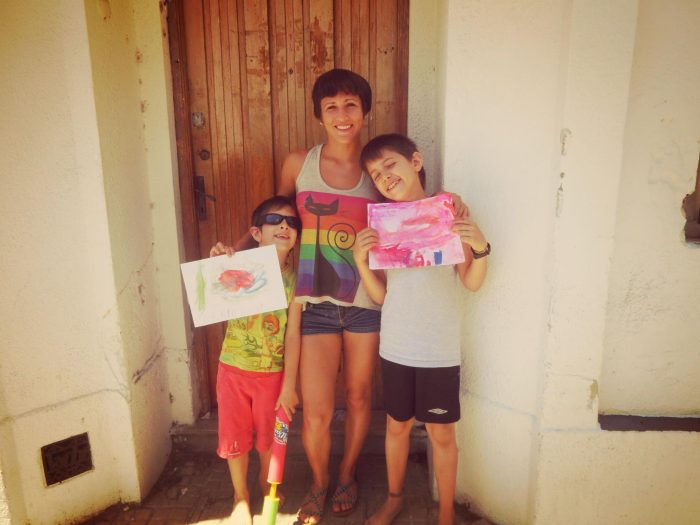Back while living in Montevideo, Uruguay, in 2013, two Uruguayan brothers were among the several students I had taught English to.
Twice a week, I rode my bike past street art, pick-up soccer games, and panadería (bakery) until finally arriving on the narrow dirt side street with colonial-style casitas (small house) where the boys’ family resided in.
The barks of the neighborhood dog Appa—whose root-beer-colored coat complemented a scrumptious white, creamsicle chest—would always signal my arrival, making the presence of a doorbell unnecessary.
Welcoming me at the door were Dante, who, with his fawn-like brown eyes and feisty yet innocent energy, quite aptly embodied the baby role of the family, and Julian, who filled the shoes of the more assertive and knowledgeable older brother.
During our time together, these boys reinforced some important truths that many of us grown-up people tend to forget.
Here are just a few of them.
1. To keep making your own choices independent of societal expectations.
While living in Uruguay, in part to give off more of a queer aesthetic, I cut my hair shorter than it had ever been before. Not only did Julian compliment the haircut, he also told me I was brave because not many girls in Uruguay choose to wear their hair like that due to the “demands” of the machismo society we, unfortunately, still live in.
I might have paraphrased Juli a little bit, but it’s no joke that the word “machismo” came from his mouth. “And it wasn’t just the fact that he knew what the word meant that impressed me, but that by incorporating it into his compliment, he called into question some of the values that are still prevalent in many countries’ patriarchal systems.”
Alain de Botton once wrote, “If we refrain from questioning the status quo, it is primarily because we associate what is popular with what is right.” The mere fact that a belief is practiced or perpetuated by many people, though, does not make it morally superior.
2. To respect sibling differences and recognize each perspective as legitimate.
Dante hated it when Julian offered unsolicited advice. One day, after he drew a picture of a fruit bowl next to a window, Julian remarked that he had “done it wrong.”
“The shadow should be on the other side, because that’s where the light’s shining through the window,” he pointed out.
After a three-second pause—just enough time for his little brother to put on his pouting Gary Coleman face—Dante dismissed the suggestion with a succinct “Shut up.”
Both of their perspectives were valid. Perhaps motivated by care and an impulse to teach Dante the ways of the world, Juli sought to help his younger and less experienced brother, then saw his attempts as having gone unappreciated. Meanwhile, Dante, out of a need for agency, wanted to do things his own way. Perhaps not wanting to be treated as a helpless and passive vessel, he viewed his sense of competence and autonomy as having been under threat.
Often we engage in reductive thinking that pits one person in a conflict as “right” against the other as “wrong.” Seeking to understand both sides’ motivations, though, can help interactions feel more like collaborations and less like competitions.
3. To have an eye for nuance and subtle differences.
Dante beamed as he showed me a picture he had just drawn of a solar system containing all sorts of flying animals. After I complimented him on his artistry and pointed out that I especially liked the bunny, Dante furrowed his brow and corrected me, “It’s not a bunny—it’s a space bunny.”
I realized that my commentary had been invalidating, albeit unintentionally. For all I knew, there could have been a number of important differences between land bunnies and space bunnies that my blanket statement had callously overlooked.
For instance, maybe space bunnies are more attuned to high-speed living and technological tasks while land bunnies are better wired for a slower, more mindful existence.
I appreciated Dante’s discernment as well as his willingness to call me out.
4. To mix up the routine a little.
On an average day, the boys and I would color and play games (such as “Memory”) that facilitated learning basic English vocabulary words. Dante and Juli responded well to my occasional breaking of this routine, though, through the introduction of the unexpected.
One class, for instance, was inspired by an artist I’d known of back in my college town. We painted using coffee as a substitute for watercolor (participating in what the artist called “Espresso-ism”). On another day, we put together bilingual books, complete with their own illustrations and original stories. Leaving room for surprise kept the boys from burning out and associating our classes with unbending monotony.
5. To keep perspective and remember that we are part of something bigger than ourselves.
Adding to his repertoire of high-minded artwork, Dante one day drew a picture of a chocolate chip cookie. I’d initially planned to ask him more basic questions such “Who’s going to eat the cookie?” or “How do you say cookie in English?”
Soon though, I realized Dante had a grander vision for his piece. Pointing at it, he made it known that this cookie wasn’t just a cookie. “Mira,” he said to me. “Esta galleta es el mundo. Estos trocitos somos nosotros.” (“Look. This cookie is the world. These chocolate chips are us.”)
I wish more people on this planet and corporations, in particular, could visualize Dante’s cookie when they inflate their own importance.
I wish gun owners and anti-maskers and global warming deniers could identify more with the tiny chocolate chips when arguing for their personal freedoms and second amendment rights.
I wish they saw the world the way this remarkable Uruguayan six-year-old, did.












Read 43 comments and reply